Elijah Wald – Musical Projects
[Home] [Bio] [Jelly Roll Blues] [Robert Johnson] [Dave Van Ronk] [Narcocorrido] [Dylan Goes Electric] [Beatles/Pop book] [The Dozens] [The Blues] [Josh White] [Hitchhiking] [Other writing] [Joseph Spence]
Press/promo pack with bio, photo, quotes, and live video
Songobiography blog (with over 300 performance videos)
 (8x10 cropped).jpg) I've been a
musician for a lot longer than I've been a writer. I started
playing guitar at age seven, and made my living off it for a dozen lean years, starting at age 18. I performed on
street corners and cafe terraces, and in bars, coffeehouses, and an occasional concert hall, as well as forming some duos, trios, and bands and working as a sideman with the legendary Black string band master Howard Armstrong and New England folk/blues stalwart Eric Von Schmidt. My main
influences were Woody Guthrie (on record), Dave Van Ronk (in person),
and the great blues fingerpickers of the 1920s -- Rev. Gary Davis, Willie McTell, Lemon Jefferson -- as well as the Bahamian
guitarist Joseph Spence (I made a DVD teaching his style) and the Congolese master Jean-Bosco Mwenda,
whom I studied with for a couple of months in Lubumbashi.
I've been a
musician for a lot longer than I've been a writer. I started
playing guitar at age seven, and made my living off it for a dozen lean years, starting at age 18. I performed on
street corners and cafe terraces, and in bars, coffeehouses, and an occasional concert hall, as well as forming some duos, trios, and bands and working as a sideman with the legendary Black string band master Howard Armstrong and New England folk/blues stalwart Eric Von Schmidt. My main
influences were Woody Guthrie (on record), Dave Van Ronk (in person),
and the great blues fingerpickers of the 1920s -- Rev. Gary Davis, Willie McTell, Lemon Jefferson -- as well as the Bahamian
guitarist Joseph Spence (I made a DVD teaching his style) and the Congolese master Jean-Bosco Mwenda,
whom I studied with for a couple of months in Lubumbashi.
 In recent years, I've compiled a kind of musical memoir I call my Songobiography, consisting of videos of over three hundred songs, with stories of how I learned them, what they mean to me, where they come from, and whatever else seemed relevant. Since the pandemic let up, I've been doing more gigging and plan to get back on the road as soon as I finish up another couple of book projects. If you want to be alerted before I come through your area, drop me a line and I'll put you on my mailing list. (There's a contact link on my homepage.)
In recent years, I've compiled a kind of musical memoir I call my Songobiography, consisting of videos of over three hundred songs, with stories of how I learned them, what they mean to me, where they come from, and whatever else seemed relevant. Since the pandemic let up, I've been doing more gigging and plan to get back on the road as soon as I finish up another couple of book projects. If you want to be alerted before I come through your area, drop me a line and I'll put you on my mailing list. (There's a contact link on my homepage.)
I've made a few recordings over the years: an LP in the early 1980s, a cassette in the early 1990s, and a CD a few years after that, which I am still fairly pleased with, mostly because of the trio of fine musicians who joined me. A few years ago I did a tour of Japan, documented on my Mikami Kan page, and I'm currently booking future gigs in the US and anywhere else folks might want to hear me -- festivals, music camps, concerts, coffee houses, low dives and honky tonks. If you know of any promising options, please check out my press/promo kit with live concert videos, enthusiastic quotes, and suchlike.
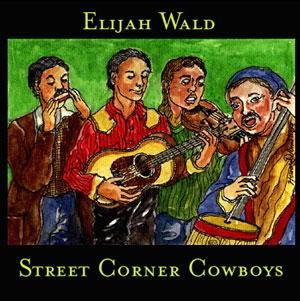 Street Corner Cowboys
(available for download from Bandcamp) is a collection of a bunch of my favorite pieces,
sung and played with some of my favorite musicians:
Street Corner Cowboys
(available for download from Bandcamp) is a collection of a bunch of my favorite pieces,
sung and played with some of my favorite musicians:
Robbie
Phillips: one-string wombat bass
Matt
Leavenworth: fiddle and mandolin
Paul Geremia: harmonica
The music ranges from blues to jive, swing, country, Bahamian, and African pieces. There are a couple of songs by Blind Lemon Jefferson, one by Woody Guthrie, one by Jean-Bosco Mwenda, and one by Harry "The Hipster" Gibson, as well as a couple of newer things from Butch Hancock and Townes Van Zandt. The musicians are all past masters of their instruments, and it was a fun session. The cover painting of us was done by Howard Armstrong, a fine painter as well as a terrific fiddler, mandolinist, singer, and bon vivant, alas no longer with us.
 I'm also pleased with the instructional DVD I did on the guitar style of Joseph Spence. I'm not going to claim I have it all exactly right, but it shows a lot of his unique moves and is a reasonable guide for anyone who wants to understand his language -- and it really is a language; once you've learned how it works, you can use it to say what you want to say, rather than just recycling his pieces.
I'm also pleased with the instructional DVD I did on the guitar style of Joseph Spence. I'm not going to claim I have it all exactly right, but it shows a lot of his unique moves and is a reasonable guide for anyone who wants to understand his language -- and it really is a language; once you've learned how it works, you can use it to say what you want to say, rather than just recycling his pieces.Aside from my own recordings, I have produced or compiled a few albums over the years. I took on these projects because I loved the music, and I unabashedly recommend them all (except my LP, about which I am abashed):
The Arhoolie Records 40th Anniversary Box: "The Journey of Chris Strachwitz" (Arhoolie)
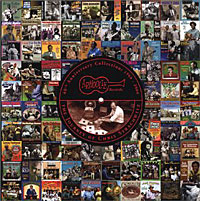 I won a
Grammy for the notes to this one, but the real honor was just being
asked to do it. By far the most ambitious album project to come my way,
it is a five-CD history of Arhoolie Records, the rootsiest of roots
music labels. It includes 106 songs by 96 artists, all recorded by
Arhoolie's president and founder Chris Strachwitz, a quirky and unique
figure who has done as much to preserve and popularize classic American
music as anyone alive. Chris started the label with a record by Texas
bluesman Mance Lipscomb in 1960, and has built up an unmatched
catalogue of blues, Cajun, Tex-Mex norteño, and a whole
bunch of other styles. We conceived this box as a sort of musical
autobiography, following Chris’s journey through the byways
of American music (with occasional detours to Austria and Afghanistan.
I wrote a 68-page book, giving the history of Arhoolie and
track-by-track reminisences from Chris about the artists and recording
sessions. The book is lavishly illustrated, the music is great, and I
could not be prouder to be associated with a retrospective set than I
am of this one. (Incidentally, along with the Album Notes award, Chris
and I were also nominated as co-producers in the Best Historical Album
category.) You can find out more about it and hear some samples at Arhoolie’s
site, which is also full of a lot of other great music.
I won a
Grammy for the notes to this one, but the real honor was just being
asked to do it. By far the most ambitious album project to come my way,
it is a five-CD history of Arhoolie Records, the rootsiest of roots
music labels. It includes 106 songs by 96 artists, all recorded by
Arhoolie's president and founder Chris Strachwitz, a quirky and unique
figure who has done as much to preserve and popularize classic American
music as anyone alive. Chris started the label with a record by Texas
bluesman Mance Lipscomb in 1960, and has built up an unmatched
catalogue of blues, Cajun, Tex-Mex norteño, and a whole
bunch of other styles. We conceived this box as a sort of musical
autobiography, following Chris’s journey through the byways
of American music (with occasional detours to Austria and Afghanistan.
I wrote a 68-page book, giving the history of Arhoolie and
track-by-track reminisences from Chris about the artists and recording
sessions. The book is lavishly illustrated, the music is great, and I
could not be prouder to be associated with a retrospective set than I
am of this one. (Incidentally, along with the Album Notes award, Chris
and I were also nominated as co-producers in the Best Historical Album
category.) You can find out more about it and hear some samples at Arhoolie’s
site, which is also full of a lot of other great music.
Snooks Eaglin: New Orleans Street Singer (Smithsonian/Folkways)
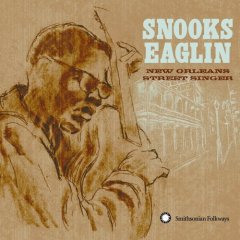 When I was a kid, my
older half-brother left his records with us for a couple of years. Of
them all, the one that excited me most was Snooks Eaglin's debut album
on Folkways. Eaglin would go on to be known as one of the great
guitarists and eccentrics of New Orleans R&B, but on this album
he just plays acoustic guitar and sings--but no one else ever played
like that. He used flamenco rasgueados, lightning-fast lead runs, jazz
chords, all backed by irresistable second-line rhythms. His version of
the jazz standard "High Society" was the all-time virtuoso intrumental
of the folk revival era. And his singing was just as good, a loping,
bluesy voice that recalled Ray Charles one minute, a country singer the
next. When I got a chance to supervise the reissue of that album, it
was one of the greatest joys and honors of my life. And we found a
bunch of unreleased tracks to flesh out the original. I cannot
recommend this album highly enough. You can hear samples at the Smithsonian/Folkways
site, and can buy online from them or--my suggestion--from New
Orleans's own Louisiana
Music Factory, which needs your support.
When I was a kid, my
older half-brother left his records with us for a couple of years. Of
them all, the one that excited me most was Snooks Eaglin's debut album
on Folkways. Eaglin would go on to be known as one of the great
guitarists and eccentrics of New Orleans R&B, but on this album
he just plays acoustic guitar and sings--but no one else ever played
like that. He used flamenco rasgueados, lightning-fast lead runs, jazz
chords, all backed by irresistable second-line rhythms. His version of
the jazz standard "High Society" was the all-time virtuoso intrumental
of the folk revival era. And his singing was just as good, a loping,
bluesy voice that recalled Ray Charles one minute, a country singer the
next. When I got a chance to supervise the reissue of that album, it
was one of the greatest joys and honors of my life. And we found a
bunch of unreleased tracks to flesh out the original. I cannot
recommend this album highly enough. You can hear samples at the Smithsonian/Folkways
site, and can buy online from them or--my suggestion--from New
Orleans's own Louisiana
Music Factory, which needs your support.
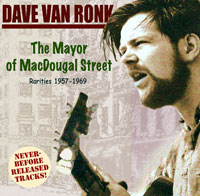 Compiled as a companion to Dave's memoir of the folk
revival, The Mayor of
MacDougal Street (Da Capo Press, 2005), this is a
collection of rare and unreleased recordings made between 1957 and
1969. It shows both familiar facets of his work -- Jelly Roll Morton's
"Buddy Bolden's Blues," Muddy Waters's "Two Trains Running" -- and
startling departures like a lovely version of "On Top of Old Smokey,"
the Brooklyn street song "Shaving Cream," and a Trotskyist bluegrass
number, "Way Down in Lubyanka Prison." Most of the tracks are solo, but
there is one cut from the rare Skiffle In Stereo
LP, and a live number from Dave's rock band, the Hudson Dusters. The
intention was to show the breadth of Dave's work, so there are also two
a cappella performances of old British ballads, one from the late
fifties and another from the mid-sixties, showing how his ballad style
evolved. There are songs by Bertolt Brecht, Joni Mitchell, and Leonard
Cohen, as well as a previously unreleased Van Ronk original, "In
Conditional Support of Beauty." All in all, this may be the most varied
Van Ronk album ever released, and fills out our understanding of a
superbly tasteful and talented artist who was the king of Greenwich
Village at the height of the folk revival and a defining influence on
everyone from Bob Dylan on down. To buy direct from Rootstock, follow this
link. To hear my spoken commentary on the album, and track by
track discussion of the songs, go to Sidetracks.
Compiled as a companion to Dave's memoir of the folk
revival, The Mayor of
MacDougal Street (Da Capo Press, 2005), this is a
collection of rare and unreleased recordings made between 1957 and
1969. It shows both familiar facets of his work -- Jelly Roll Morton's
"Buddy Bolden's Blues," Muddy Waters's "Two Trains Running" -- and
startling departures like a lovely version of "On Top of Old Smokey,"
the Brooklyn street song "Shaving Cream," and a Trotskyist bluegrass
number, "Way Down in Lubyanka Prison." Most of the tracks are solo, but
there is one cut from the rare Skiffle In Stereo
LP, and a live number from Dave's rock band, the Hudson Dusters. The
intention was to show the breadth of Dave's work, so there are also two
a cappella performances of old British ballads, one from the late
fifties and another from the mid-sixties, showing how his ballad style
evolved. There are songs by Bertolt Brecht, Joni Mitchell, and Leonard
Cohen, as well as a previously unreleased Van Ronk original, "In
Conditional Support of Beauty." All in all, this may be the most varied
Van Ronk album ever released, and fills out our understanding of a
superbly tasteful and talented artist who was the king of Greenwich
Village at the height of the folk revival and a defining influence on
everyone from Bob Dylan on down. To buy direct from Rootstock, follow this
link. To hear my spoken commentary on the album, and track by
track discussion of the songs, go to Sidetracks.
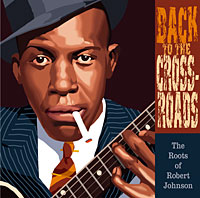 Designed
to accompany my book Escaping
the Delta, this includes 23 tracks that show
Johnson's own musical sources. Some are Delta artists like his mentor
Son House and Charlie Patton. Others are records he clearly liked and
adapted: Kokomo Arnold's "Old Original Kokomo Blues" and "Milk Cow
Blues" (sources for "Sweet Home Chicago" and "Milk Cow's Calf"), Leroy
Carr's "When the Sun Goes Down" ("Love in Vain"), Peetie Wheatstraw's
"King of Spades" ("Queen of Spades"), Skip James's "22-20" and "Devil
Got My Woman" ("32-20" and "Hellhound on My Trail"), Bumblebee Slim's
"Cruel Hearted Woman" ("Kind Hearted Woman"), Hambone Willie Newbern's
"Roll and Tumble" ("If I Had Possession Over Judgement Day"), Lonnie
Johnson's "Life
Saver Blues" ("Drunken Hearted Man" and "Malted Milk") and
Tampa Red's "Things Bout ComingMy Way" ("Come on in My Kitchen"). There
are also records that, while Johnson may not have heard them, show the
kind of musicians or songs that affected his work, such as the
Mississippi Jook Band's "Hittin' the Bottle Stomp," a perfect example
of the way local juke bands played songs like Johnson's "They're Red
Hot," and gems from Blind Lemon Jefferson, Scrapper Blackwell, and the
Mississippi Sheiks. A lot of people today think of Johnson as the roots
of the blues, but he had his own roots, and this compilation lays them
all out. It should be available in early January, timed with the book
release, , and it should be in all good record stores. If for some
reason your local store can't help you, you can also buy it online by
clicking this link, and you can hear
samples of a few tracks at the Yazoo
site.
Designed
to accompany my book Escaping
the Delta, this includes 23 tracks that show
Johnson's own musical sources. Some are Delta artists like his mentor
Son House and Charlie Patton. Others are records he clearly liked and
adapted: Kokomo Arnold's "Old Original Kokomo Blues" and "Milk Cow
Blues" (sources for "Sweet Home Chicago" and "Milk Cow's Calf"), Leroy
Carr's "When the Sun Goes Down" ("Love in Vain"), Peetie Wheatstraw's
"King of Spades" ("Queen of Spades"), Skip James's "22-20" and "Devil
Got My Woman" ("32-20" and "Hellhound on My Trail"), Bumblebee Slim's
"Cruel Hearted Woman" ("Kind Hearted Woman"), Hambone Willie Newbern's
"Roll and Tumble" ("If I Had Possession Over Judgement Day"), Lonnie
Johnson's "Life
Saver Blues" ("Drunken Hearted Man" and "Malted Milk") and
Tampa Red's "Things Bout ComingMy Way" ("Come on in My Kitchen"). There
are also records that, while Johnson may not have heard them, show the
kind of musicians or songs that affected his work, such as the
Mississippi Jook Band's "Hittin' the Bottle Stomp," a perfect example
of the way local juke bands played songs like Johnson's "They're Red
Hot," and gems from Blind Lemon Jefferson, Scrapper Blackwell, and the
Mississippi Sheiks. A lot of people today think of Johnson as the roots
of the blues, but he had his own roots, and this compilation lays them
all out. It should be available in early January, timed with the book
release, , and it should be in all good record stores. If for some
reason your local store can't help you, you can also buy it online by
clicking this link, and you can hear
samples of a few tracks at the Yazoo
site.
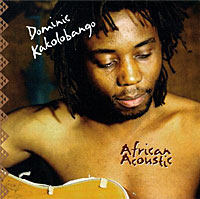 A close
friend of mine, Dominic Kakolobango is the only artist recording in the
classic Congolese acoustic style of Jean-Bosco Mwenda and Losta Abelo,
once the most popular guitar music in Africa. Born in Zambia and raised
in Southeastern Zaire, he studied and played with the old masters,
absorbed their work, and has expanded and developed it into a unique
and personal style. To the basic line-up of lilting vocals, acoustic
guitars and coke bottle, he adds touches of blues and soukous. I play
some acoustic guitar on a few songs, and the Flemish blues harmonicist
Ludo Beckers makes an appearance as well, but the main sideman is the
electric guitarist Dizzy Mandjeku. Mandjeku made his name playing with
the legendary Franco, and is one of the most in-demand players on the
European soukous scene, but he also has a rare grasp of the older,
quieter styles, and his taste and lightness of touch that make him a
partner rather than a competitor to Dominic’s acoustic work.
The album includes original songs as well as new versions of Eastern
Congolese classics, and even a Texas blues song, reflecting the range
of music that Dominic has absorbed over the years. The result is deeply
rooted in the tradition but also completely contemporary, a young voice
revitalizing a golden age of African popular music.
A close
friend of mine, Dominic Kakolobango is the only artist recording in the
classic Congolese acoustic style of Jean-Bosco Mwenda and Losta Abelo,
once the most popular guitar music in Africa. Born in Zambia and raised
in Southeastern Zaire, he studied and played with the old masters,
absorbed their work, and has expanded and developed it into a unique
and personal style. To the basic line-up of lilting vocals, acoustic
guitars and coke bottle, he adds touches of blues and soukous. I play
some acoustic guitar on a few songs, and the Flemish blues harmonicist
Ludo Beckers makes an appearance as well, but the main sideman is the
electric guitarist Dizzy Mandjeku. Mandjeku made his name playing with
the legendary Franco, and is one of the most in-demand players on the
European soukous scene, but he also has a rare grasp of the older,
quieter styles, and his taste and lightness of touch that make him a
partner rather than a competitor to Dominic’s acoustic work.
The album includes original songs as well as new versions of Eastern
Congolese classics, and even a Texas blues song, reflecting the range
of music that Dominic has absorbed over the years. The result is deeply
rooted in the tradition but also completely contemporary, a young voice
revitalizing a golden age of African popular music.
To hear some samples and learn more about this project, go to the Africassette website.
To learn more about this kind of music and get some classic recordings of the Congolese masters, check out my African Acoustic page.
I no longer have copies of this CD for sale, but you can find them on the Perry page of his wife's website.
Preacher Jack: Return of the Boogie Man (Rounder)
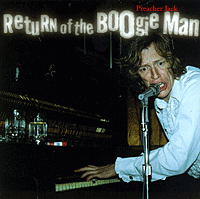 I
was not around when these tracks were recorded, but I helped choose
them from old studio tapes, and did the liner notes. Preacher Jack
Coughlin is a crazed and brilliant pianist and singer who believes
himself to be the reincarnation of Albert Ammons, Mahalia Jackson, Hank
Williams, and Liberace, though other people often compare him to Jerry
Lee Lewis. He has always been a favorite of mine, and once he started
playing regularly at Frank’s Steak House in Cambridge I made
it down there every week for a couple of years. I was never
disappointed. No album will ever capture the sheer, manic power of a
great Preacher Jack night, but this one has some of the greatest
boogie-woogie piano, honky-tonk vocals, and rock
’n’ roll energy anyone could ask for. You can hear musical samples on Amazon. You
might also want to check out his solo instrumental album, Non-Stop
Boogie (Solo Art), for which I did the liner notes as well.
I
was not around when these tracks were recorded, but I helped choose
them from old studio tapes, and did the liner notes. Preacher Jack
Coughlin is a crazed and brilliant pianist and singer who believes
himself to be the reincarnation of Albert Ammons, Mahalia Jackson, Hank
Williams, and Liberace, though other people often compare him to Jerry
Lee Lewis. He has always been a favorite of mine, and once he started
playing regularly at Frank’s Steak House in Cambridge I made
it down there every week for a couple of years. I was never
disappointed. No album will ever capture the sheer, manic power of a
great Preacher Jack night, but this one has some of the greatest
boogie-woogie piano, honky-tonk vocals, and rock
’n’ roll energy anyone could ask for. You can hear musical samples on Amazon. You
might also want to check out his solo instrumental album, Non-Stop
Boogie (Solo Art), for which I did the liner notes as well.
The Mississippi: River of Song (Smithsonian/Folkways)
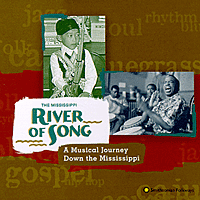 This
is a two-CD set, designed to go with the book and PBS TV series in
which a bunch of us traveled the length of the Mississippi, visiting
musicians who seemed representative of each region, from gospel choirs
to blues singers, German polka to riot grrl punk bands to Spanish
ballad singers. All in all, a very varied
set of music, recorded in live settings that capture the full flavor of
the styles. It
includes a ridiculous Scandinavian vaudeville number, some good blues,
a unique acoustic session with the Memphis Horns and Ann Peebles,
Fontella Bass singing with her mother, a hot Eddie Bo track, plus
Cajun, zydeco, norteño, rockabilly, and god knows what all.
There is a lot more information on River
of Song's website , and you might also want to check out the
book on my Books and Writings page.
This
is a two-CD set, designed to go with the book and PBS TV series in
which a bunch of us traveled the length of the Mississippi, visiting
musicians who seemed representative of each region, from gospel choirs
to blues singers, German polka to riot grrl punk bands to Spanish
ballad singers. All in all, a very varied
set of music, recorded in live settings that capture the full flavor of
the styles. It
includes a ridiculous Scandinavian vaudeville number, some good blues,
a unique acoustic session with the Memphis Horns and Ann Peebles,
Fontella Bass singing with her mother, a hot Eddie Bo track, plus
Cajun, zydeco, norteño, rockabilly, and god knows what all.
There is a lot more information on River
of Song's website , and you might also want to check out the
book on my Books and Writings page.
Josh White: Free and Equal Blues (Smithsonian/Folkways)
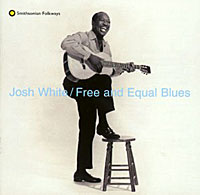 This was put
together while I was working on my biography of Josh, from the many
recordings Moe Asch did for his Asch record label. These sessions were
done in the mid-1940s, the golden age of Josh's career, and Asch gave
him the opportunity to range through all his repertoire, from blues to
pop tunes, plus a bunch of political songs that range from the merely
historically interesting to wonderful numbers like the title song, a
very funny protest number with a lyric by the pop songwriter Yip
Harburg. This is really Josh at his best, and Smithsonian gave me a
chance to write very complete notes on both Josh and the individual
songs. You can find out more about this one, and hear samples on the Smithsonian/Folkways
website.
This was put
together while I was working on my biography of Josh, from the many
recordings Moe Asch did for his Asch record label. These sessions were
done in the mid-1940s, the golden age of Josh's career, and Asch gave
him the opportunity to range through all his repertoire, from blues to
pop tunes, plus a bunch of political songs that range from the merely
historically interesting to wonderful numbers like the title song, a
very funny protest number with a lyric by the pop songwriter Yip
Harburg. This is really Josh at his best, and Smithsonian gave me a
chance to write very complete notes on both Josh and the individual
songs. You can find out more about this one, and hear samples on the Smithsonian/Folkways
website.
Elijah Wald: Songster, Fingerpicker, Shirtmaker (Reckless)
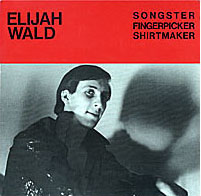 My legendary LP, produced by Bill Morrissey, back when we had a record company together for about a year, before he went on to fame and fortune. Co-produced by my
ex-half-sister-in-law, Hazel, whose main contribution was dancing the Charleston in the control booth when I played "Five Foot Two, Eyes of Blue." Liner notes by Dave Van Ronk. My favorite thing about this album was always the cover photo, which I like to think makes me look like a cross between Elvis and Dracula. If anyone wants a copy, I still have a
basement full, and can give a much better price if you care to order in bulk -- aside from their dubious sonic virtues, they make excellent skeet.
My legendary LP, produced by Bill Morrissey, back when we had a record company together for about a year, before he went on to fame and fortune. Co-produced by my
ex-half-sister-in-law, Hazel, whose main contribution was dancing the Charleston in the control booth when I played "Five Foot Two, Eyes of Blue." Liner notes by Dave Van Ronk. My favorite thing about this album was always the cover photo, which I like to think makes me look like a cross between Elvis and Dracula. If anyone wants a copy, I still have a
basement full, and can give a much better price if you care to order in bulk -- aside from their dubious sonic virtues, they make excellent skeet.
Corridos y Narcocorridos (Fonovisa)
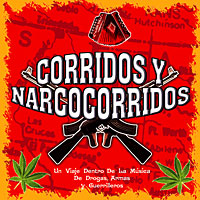 This is an anthology of Mexican corridos, which
I compiled to accompany my book "Narcocorrido."
Issued by Fonovisa, the largest independant record label in the US and
main player in Mexican regional music, it has eight tracks by Los
Tigres del Norte, the defining band in modern norteno music. These
include their classic hits "Contrabando y Traicion," "La Banda del
Carro Rojo," "Jaula de Oro," and "El Circo," and show their evolution
from the seminal drug ballad band into the most thoughtful social
commentators on the contemporary scene. The eight other tracks are a
gunfighter ballad from Luis y Julian; narcocorridos from Chalino
Sanchez, Jenni Rivera, Grupo Exterminador, and the guitar-and-tuba trio
El Canelo y los Dos del Sitio; Pedro Rivera's corrido of the Rodney
King riots; a corrido of guerrilla war from the guitar duo Los
Pajaritos del Sur, and a paean to the corrido writer Rafael Alvarez
Sanchez by the Michoacano harp band Los Hermanos Jimenez. There are
extensive notes about the bands and songs. However, this CD sadly went
out of print when Fonovisa merged with Univision, though secondhand
copies occasionally turn up. Lyrics to all but one of the included
corridos are on my cd lyrics page.
This is an anthology of Mexican corridos, which
I compiled to accompany my book "Narcocorrido."
Issued by Fonovisa, the largest independant record label in the US and
main player in Mexican regional music, it has eight tracks by Los
Tigres del Norte, the defining band in modern norteno music. These
include their classic hits "Contrabando y Traicion," "La Banda del
Carro Rojo," "Jaula de Oro," and "El Circo," and show their evolution
from the seminal drug ballad band into the most thoughtful social
commentators on the contemporary scene. The eight other tracks are a
gunfighter ballad from Luis y Julian; narcocorridos from Chalino
Sanchez, Jenni Rivera, Grupo Exterminador, and the guitar-and-tuba trio
El Canelo y los Dos del Sitio; Pedro Rivera's corrido of the Rodney
King riots; a corrido of guerrilla war from the guitar duo Los
Pajaritos del Sur, and a paean to the corrido writer Rafael Alvarez
Sanchez by the Michoacano harp band Los Hermanos Jimenez. There are
extensive notes about the bands and songs. However, this CD sadly went
out of print when Fonovisa merged with Univision, though secondhand
copies occasionally turn up. Lyrics to all but one of the included
corridos are on my cd lyrics page.
Other projects
I also co-produced the first LP by New England’s master songwriter Bill Morrissey, as a reciprocal deal when he was producing the above album. It was soon picked up by Rounder, and then Bill decided to re-record all the songs for the CD reissue. I was not around for that session, and thus am no longer listed as co-producer, but it is still a great album.
I also have done liner notes for various albums that I was not involved in producing or compiling, but which I still heartily recommend, among them these:
 Peter
Keane and I have played together a lot over the years. I liked this album, Walkin' Around, and liked some of his later ones even better. He moved to Austin, Texas, decades ago, and I'm overdue for a visit. Meanwhile, there is information about him on his web site.
Peter
Keane and I have played together a lot over the years. I liked this album, Walkin' Around, and liked some of his later ones even better. He moved to Austin, Texas, decades ago, and I'm overdue for a visit. Meanwhile, there is information about him on his web site.
 Les Sampou is likewise an old friend and great player, and I was very pleased that
she asked me to do the notes to Fall from Grace. You can find out more on her web site.
Les Sampou is likewise an old friend and great player, and I was very pleased that
she asked me to do the notes to Fall from Grace. You can find out more on her web site.
 Dave was one of my best friends, as well as an early musical hero. Sunday Street and Somebody Else, Not Me are among his finest albums, and I was thrilled to do the notes for their CD reissues. I have lots more about Dave on the page for his memoir, The Mayor of MacDougal Street.
Dave was one of my best friends, as well as an early musical hero. Sunday Street and Somebody Else, Not Me are among his finest albums, and I was thrilled to do the notes for their CD reissues. I have lots more about Dave on the page for his memoir, The Mayor of MacDougal Street.
 This was Dave's last concert. He was going into the hospital the next morning,
and knew it might be his last, but his stories were as sharp and funny
as ever, and he played and sang at the top of his form. ...and the Tin Pan Bended and the Story Ended... is a
masterpiece from beginning to end.
This was Dave's last concert. He was going into the hospital the next morning,
and knew it might be his last, but his stories were as sharp and funny
as ever, and he played and sang at the top of his form. ...and the Tin Pan Bended and the Story Ended... is a
masterpiece from beginning to end.
 I loved having the chance to do the notes for the reissue of Ramblin' Jack
Elliot's Early Sessions with Derrol Adams
They still sound great, and there is music and more at his
web site.
I loved having the chance to do the notes for the reissue of Ramblin' Jack
Elliot's Early Sessions with Derrol Adams
They still sound great, and there is music and more at his
web site.

 From New
York to London(Jasmine) has many of Josh's greatest recordings from the '40s and '50s. The Best of Josh White (Tradition) is an odd session with an English jazz
combo.
From New
York to London(Jasmine) has many of Josh's greatest recordings from the '40s and '50s. The Best of Josh White (Tradition) is an odd session with an English jazz
combo.
 Eddie Kirkland was, in my humble opinion, the hardest blues musician on the road in the 1990s. I actually liked his live album better than this one, but his live shows were best of all.
Eddie Kirkland was, in my humble opinion, the hardest blues musician on the road in the 1990s. I actually liked his live album better than this one, but his live shows were best of all.
 Robert
Pete Williams was one of the most soulful singers and distinctive
guitarists ever recorded. From Louisiana, he comes closer than any
other bluesman to retaining a traditional African approach in his
music. All of his albums are great, especially the ones on the Arhoolie
label, of which this one, Poor
Bob's Blues, is the most recent release.
Robert
Pete Williams was one of the most soulful singers and distinctive
guitarists ever recorded. From Louisiana, he comes closer than any
other bluesman to retaining a traditional African approach in his
music. All of his albums are great, especially the ones on the Arhoolie
label, of which this one, Poor
Bob's Blues, is the most recent release.